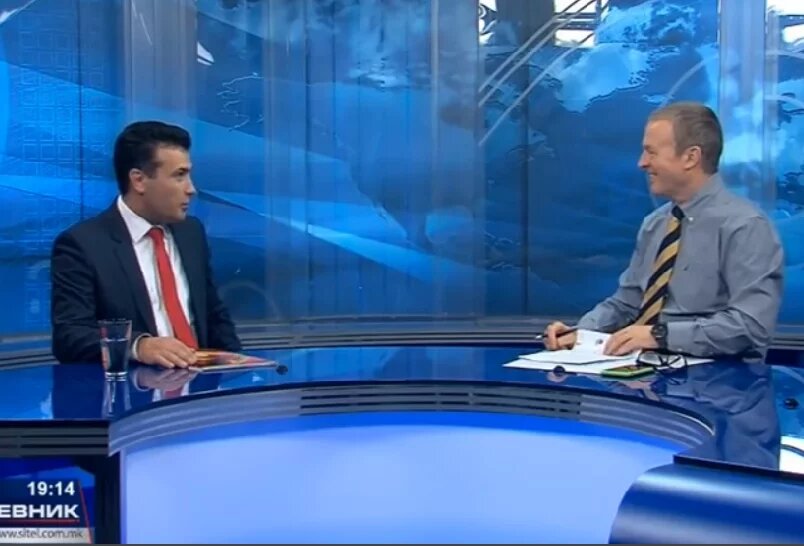
Macedonian media are in the middle of a number of political disputes making the deepest political crises in the country since the ethnic conflict in 2001. That includes both the commercial sector of the media, and the public broadcaster Macedonian Radio-Television, MRTV. In most years of the last decade the likes of the opposition politicians and their activities appearing through the news and other programs of the private and public broadcasters were so rear that, excluding negative framed news and stories, the opposition was virtually absent from the air. On the other hand, governmental officials were parading in front of the cameras and microphones in endless lines, continually proclaiming the “Paradise on Earth” that Macedonia has become in never ending government’s propaganda.
How the opposition was treated is very illustrative with the recent interview of Mr. Zoran Zaev, president of the opposition Social-demcratic Alliance of Macedonia, on the main pro-government TV Sitel’s primetime news (http://sitel.com.mk/celoto-intervju-na-zoran-zaev-kaj-latas-vo-dnevniko…): the editor in chief of this TV, conducting a 20 minutes talk with Zaev, so much insulted, threatened, and intimidated his guest that it came as a scandal among many of the supporters of the government, too. If not for the very thick nerves of Zaev, the interview could have ended in an actual physical incident in the TV studio, which may have been the real intention of this “interview” in the first place.
Colonization of the media
Political influence on editorial policies through the means of government advertising and other politically inspired financial incentives (direct subventions, special project financing, selective coverage of production expenses, selective tolerance of tax evasion etc.) in the Macedonian media market has reached the “fine art” levels since 2006, the year when the current autocratic regime of VMRO-DPMNE and its undisputed populist leader Nikola Gruevski came to power in Macedonia. In the following ten years since 2006, Mr. Gruevski and his party successfully “colonized” 90% of the media market in the country. They used various means and methods of submission: arrests of disobedient media owners and journalists, closing down of defiant media, takeovers of various print and electronic media outlets by companies and businessmen close to the government, or editorial policy “buyouts” of a number of media houses through millions of Euros of public money spent on aggressive propagandistic campaigns by the government or various public and state institutions. Macedonian government, year by year, is one of the biggest TV advertisers on the national media market, regularly outspending companies like Coca Cola, Proctor & Gamble or national telecoms.
All of the institutions in the country that should have blocked those actions by the governing party – State Anticorruption Commission, state Agency for media regulation and other supposed to be independent regulatory bodies – were conveniently filled with governing parties’ cadres and submitted to total party obedience, allowing illegal and unfair governing coalition practices in the media field.
Public money for party influence
Once the Macedonian media scene was ideologically “pacified” and “purified” according to VMRO-DPMNE’s political “taste” in the period of 2009-2011, selective and excessive usage of public money for party influence over the media became the preferred (“civilized”) option by the government. It resulted in repulsively close relations between the Macedonian government and most of the current media proprietors and their editorial teams in the country. Fear, censorship and self-censorship are widespread among the journalistic professionals in the nation.
Who hast he biggest campaign?
Probably the most obvious examples of VMRO-DPMNE’s modus operandi in the media sphere in the country were demonstrated in the 2014 election campaigns. Namely, the disproportion in election propaganda budgets of the main political contenders in the Macedonian vote is not less than vulgar. According to the official financial reports submitted by the political parties after the regular presidential and early parliamentary elections in April of 2014, the governing VMRO-DPMNE spent 1.96 million Euro for parliamentary and presidential advertising campaigns, while the opposition SDSM’s figures are approximately 145,000 Euro, or 13 times less than VMRO-DPMNE’s electoral spending power. Consequently, the quantitative measurement of the frequency of published advertising in the six daily newspapers in Macedonian language during a total of three weeks of combined 2014 presidential and parliamentary election campaigns show stunning differences when the Macedonian leading governmental and leading opposition parties are compared. In that period, as paid advertising, VMRO-DPMNE published 324 full size pages of advertisements, 96 half pages and 123 banners (mostly on the front pages of dailies), while SDSM published only 23 full pages and 24 banners – the ratio between the government and the opposition advertisements being roughly 16:1, meaning that for every 16 full size newspaper pages of VMRO-DPMNE’s advertisements, SDSM published only 1 page of its own campaign propaganda!
Battle for the Media
Having this grim reality in mind, it should not be surprising that now Macedonian opposition – supported by international mediators in the crises, representing the EU and the U.S. government – insists, among other things, on a thorough and meaningful reform of the public and commercial media sector before going on early parliamentary elections this year. Knowing the power of media in politics, VMRO-DPMNE and their media moguls do not spear efforts in defending their positions and vested interests. They know that “the battle for the media” may well decide who will win the next elections in Macedonia.